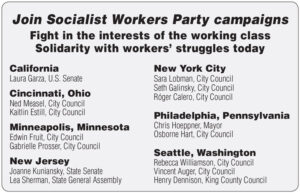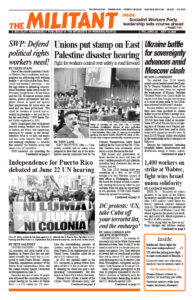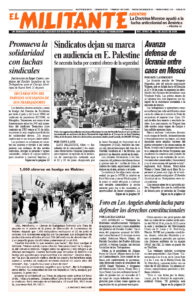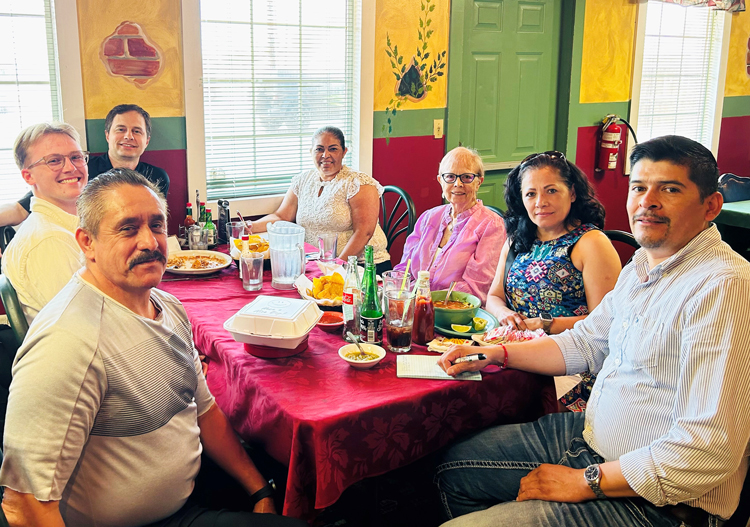One of the central questions Socialist Workers Party candidates and campaigners are addressing with working people — on strike picket lines, farmsteads and workers’ doorsteps — are the high stakes in defending constitutional freedoms under attack today by President Joseph Biden’s White House and the FBI. Whenever workers build unions, protest government and employer abuses or speak out against their preparations for more wars, we need and use these protections. “We stand for freedom of speech and assembly in principle — not just for us, but for everybody,” SWP leader Farrell Dobbs explained in 1961.
Party campaigners find widespread interest among workers and farmers in finding out about, and supporting, resistance by unions to the bosses’ relentless drive to cut jobs and wages and toss aside concern about safety and working conditions — assaults that underlie the broader social and moral crisis of capitalism.
SWP members are spreading the word and building support for these union struggles, and present a program to advance the unity of all workers. They point out the road for the union movement to break with the Democrats and Republicans — the two main parties of the capitalist rulers — and form a labor party to fight to take political power.
In doing so, they point to the example of Cuba’s socialist revolution, where workers and farmers transformed themselves in struggle and took control of their own destiny.
Such discussions are of particular interest to workers involved in strikes and union-organizing efforts, which have spread since the end of the pandemic.
Vincent Auger, SWP candidate for Seattle City Council District 1, and party members Jacob Perasso and Michele Smith sat down June 26 with mushroom workers fighting to win union recognition for the United Farm Workers and for better job conditions at Windmill Farms in Sunnyside, Washington.
Bosses have tried to use the fact many workers there don’t have all the papers the government requires, to intimidate them and set back efforts to win a union. Last year they brought in “guest workers,” who have less rights because they’re on the government’s H-2A visa program. Mushroom picker Isela Cabrera told the SWP campaigners that the workers’ efforts to win a union are tied to the fight for immigrant rights.
“Our campaign explains that a fight for amnesty for all immigrant workers in the U.S. is a life-or-death question for the labor movement,” Auger said.
Onesimo Jaime, an apple-packing worker, said that a petition being circulated among workers to show support for the union-organizing effort is gaining signatures.
It’s vital the labor movement also take on “the criminalization of political differences being carried out by Democrats against Donald Trump, including the latest indictment and charges,” Perasso said. “All history shows that this will be carried out against workers, the unions and against working-class parties.”
As an example, he pointed to decades of assaults by the FBI on the political rights of the SWP. The party launched a far-reaching public campaign and filed a lawsuit in 1973 against the government and its main political police agency, the FBI. That victorious fight forced out thousands of government documents that revealed the scope of government spying, disruption and dirty tricks against the party and others fighting the policies of the bosses and their government.
For the first time, the court ruled that the FBI’s operations were illegal and the SWP’s activities are protected by the U.S. Constitution.
Ramon Gonzalez, a farmworker who has steadfastly supported the United Farm Workers organizing drive, said that divisions among workers are fostered by both the Democratic and Republican parties and make it harder to unite working people.
Cabrera, Gonzalez, Jaime and two other union stalwarts all signed up for subscriptions to the Militant and got copies of The Low Point of Labor Resistance Is Behind Us: The Socialist Workers Party Looks Forward by SWP leaders Jack Barnes, Mary-Alice Waters and Steve Clark.
Jaime also purchased Teamster Rebellion by Farrell Dobbs. The title describes the forging of a class-struggle leadership in the course of hard-fought strike battles that made Minneapolis a union town in the 1930s, launched a wide-ranging organizing drive among truckers across the Midwest and transformed the workers involved. Gonzalez got a copy of The Turn to Industry: Forging a Proletarian Party by Barnes.
To join SWP candidates campaigning, contact the party branch nearest you.
Jacob Perasso in Seattle contributed to this article.



